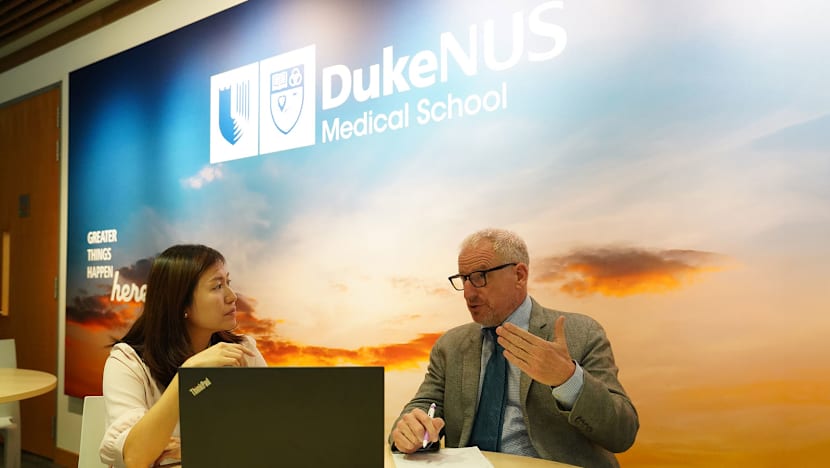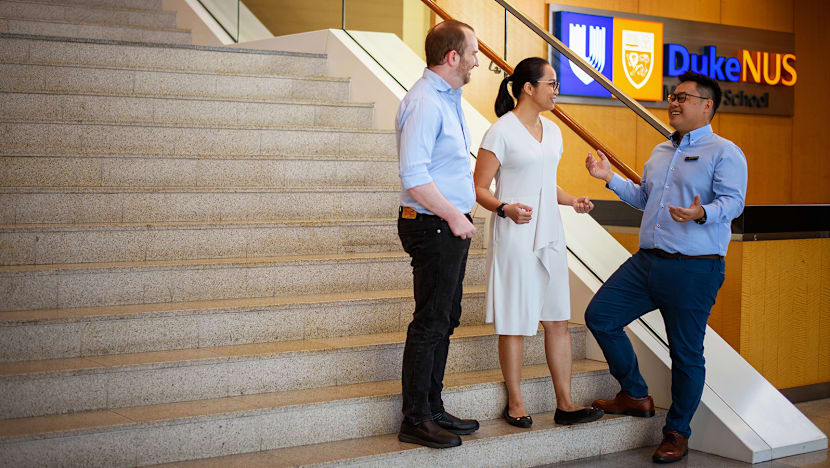Turning ideas into impact: Building healthcare innovation from the ground up
The Duke-NUS Graduate Certificate in Health Services Innovation equips healthcare professionals with the tools to drive meaningful change – combining academic rigour, real-world relevance and a clear path to leadership.

Dr Lynette Lee Mei Yi and Prof Nicholas Graves at Duke-NUS Medical School, where healthcare professionals gain the skills to lead innovation and improve patient care. Photos: Duke-NUS Medical School

This audio is generated by an AI tool.
Working with patients in Sengkang General Hospital’s (SKH) Sengkang Weight Improvement Therapy and Complete Health (SWITCH) programme helped Dr Lynette Lee Mei Yi realise the importance of using innovative and holistic approaches to help people make lasting lifestyle changes.
A consultant at SKH’s Department of Endocrinology, Dr Lee explained that beyond routine clinical care, a deeper understanding of behavioural science and healthcare system design and delivery are all essential to long-term patient management and support.
“Obesity and weight management are complex and multifactorial, and there is no one-size-fits-all approach,” she said. “That realisation motivated me to build skills in health services innovation so I can connect clinical insight with practical, sustainable and evidence-based solutions.”
In 2023, she enrolled in Duke-NUS Medical School’s Graduate Certificate in Health Services Innovation (GC HSI). The only programme of its kind in Singapore, the GC HSI is designed to meet rising demand for value-based care – improving health outcomes while making care more efficient and affordable. Rather than measuring success by volume of services, value-based care focuses on delivering timely, appropriate and effective care that helps patients stay well and avoid unnecessary hospital visits.
IMPROVING HEALTH SERVICES THROUGH INNOVATION
Participants in the GC HSI take four courses that cover implementation science; health services research methods; health technology assessment, economic evaluation and decision making; and healthcare and data science.
Developed and taught by Duke-NUS faculty in collaboration with SingHealth leaders, the curriculum addresses challenges in Singapore’s healthcare system, such as an ageing population, rising rates of chronic diseases and the rapid emergence of new technologies.
Professor Nicholas Graves, deputy director of the Signature Research Programme in Health Services Research and Population Health at Duke-NUS, said these challenges have created mounting financial pressures on the healthcare system.
“Spending more as a way of meeting new demand is not only unsustainable but might bake inefficiencies into the system. Healthcare professionals who are grounded in healthcare experience and knowledgeable about epidemiology, decision modelling and economic evaluation can find cost-effective innovations to make our health dollars go further.”
The combination of Duke-NUS’ academic and research expertise and SingHealth’s practical experience in driving change within large, complex organisations offers GC HSI participants a particularly relevant and enriching learning experience, he added.
Dr Lee said that instructors often encouraged participants to explore their own workplace challenges during group discussions and apply what they had learnt to ongoing projects. “The process helped me to see my work through a different lens and identify gaps I hadn’t noticed before. It also meant that by the time I left each module, I could refine existing project ideas that could be brought back to my team.”
For example, her knowledge of implementation frameworks in health sciences gave her a more structured way to assess interventions. Beyond determining whether something worked, she could now analyse how and why, with greater attention to setting, feasibility, sustainability and scalability.
“I developed a deeper understanding of the underlying psychology and theory in behavioural change,” she added. “In weight management, this is especially relevant because success depends so much on context, culture and individual readiness to change.”
BRIDGING THE GAP BETWEEN RESEARCH AND THE REAL WORLD

Besides building their capacity for innovation, GC HSI participants also work with established health services research groups. These collaborations provide technical expertise to help shape projects, advise on data collection, and support clinical teams in analysing and interpreting findings, said Prof Graves.
“Research collaborations foster innovative developments grounded in solid science, with people at the centre. Through team outputs such as peer-reviewed journal articles, GC HSI participants also have opportunities to broaden their networks,” he said.
Dr Lee said these research links proved valuable. Feedback from experts who understood both clinical practice and research methodology was “insightful and constructive”, she added. “When I shared a sample project design, they helped refine it so it was not only academically rigorous but practical to implement. These connections really bridged the gap between research and reality.”
She also cited the diversity of participants and faculty as a highlight of the programme, noting that the different perspectives provided by doctors, nurses, allied health professionals, administrators and researchers helped connect scientific discovery with real-world clinical challenges.
“A classmate shared a workplace project that inspired me to try a similar approach in my own practice,” she said. “Staying connected with a group of like-minded colleagues who are passionate about making a difference has kept me inspired and motivated.”
A STEP TOWARDS LEADING CHANGE IN HEALTHCARE
The GC HSI is designed with working professionals in mind. Its flexible structure delivers each module over five days of contact time, split into two blocks to accommodate busy schedules, said Prof Graves.
“The first block is three intensive days, followed by a one-month break for reflection and revision, before a second block of two days,” he explained. “There’s also a student assignment during the break.”
Dr Lee said this structure gave her time to absorb the course material and apply it in real life. The blended format also allowed her to continue her clinical work while investing in her own development. Since graduating this year, she hopes to continue building on what she has learnt through further training and generating new projects.
For healthcare professionals looking to progress in their careers, the GC HSI can serve as a stepping stone. Credits from the certificate can be stacked towards Duke-NUS’ upcoming Master in Population Health and Health Services Evaluation programme, as well as the PhD in Population and Health Services Research.
“If you’re passionate about improving healthcare, the programme gives you the frameworks, tools and support to turn ideas into action,” shared Dr Lee. “It helps you grow as a clinician and as a change-maker – and ultimately, it benefits the patients and communities we serve.”
Learn more about the Duke-NUS Graduate Certificate in Health Services Innovation.















